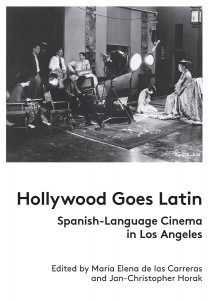Hollywood Goes Latin
Spanish-Language Cinema in Los Angeles
Edited by María de las Carreras and Jan-Christopher Horak


Average rating: ![]()
| 0 | rating | |
| 0 | rating | |
| 0 | rating | |
| 0 | rating |
Your rating: -
Book Presentation:
In the 1920s, Los Angeles enjoyed a buoyant homegrown Spanish-language culture comprised of local and itinerant stock companies that produced zarzuelas, stage plays, and variety acts. After the introduction of sound films, Spanish-language cinema thrived in the city's downtown theatres, screening throughout the 1930s, 1940s, and 1950s in venues such as the Teatro Eléctrico, the California, the Roosevelt, the Mason, the Azteca, the Million Dollar, and the Mayan Theater, among others. With the emergence and growth of Mexican and Argentine sound cinema in the early to mid-1930s, downtown Los Angeles quickly became the undisputed capital of Latin American cinema culture in the United States. Meanwhile, the advent of talkies resulted in the Hollywood studios hiring local and international talent from Latin America and Spain for the production of films in Spanish. Parallel with these productions, a series of Spanish-language films were financed by independent producers. As a result, Los Angeles can be viewed as the most important hub in the United States for the production, distribution, and exhibition of films made in Spanish for Latin American audiences.
In April 2017, the International Federation of Film Archives organized a symposium, "Hollywood Goes Latin: Spanish-Language Cinema in Los Angeles," which brought together scholars and film archivists from all of Latin America, Spain, and the United States to discuss the many issues surrounding the creation of Hollywood's "Cine Hispano." The papers presented in this two-day symposium are collected and revised here.
This is a joint publication of FIAF and UCLA Film & Television Archive.
About the authors:
María Elena de las Carreras is a Fulbright scholar from Argentina, living in Los Angeles, California, since 1987. A lecturer in film studies at UCLA and Cal State Northridge, she is a regular collaborator of the Latin American Cinemateca of Los Angeles and an accredited journalist at the Berlin Film Festival since 1986. In 2017 she co-curated the U.C.L.A. Film & Television Archive series "Recuerdos de un cine en español: Latin American cinema in Los Angeles, 1930-1930". Since 2014 she has been a researcher and interviewer for the Academy of Motion Picture Arts and Sciences' Visual History Program. Publications include "A case of entente cordiale between State and Church", chapter in Moralizing Cinema; "The 'Setentista' discourse in recent Argentine political documentaries", Arctic Antarctic, vol. 6 no. 6, 2012; "Luis Buñuel's quarrel with the Catholic Church", Buñuel, sigloI. Spain: Instituto Fernando el Católico; "The Catholic Vision in Hollywood", Film History, 14, 2, 2002; "El control de cine en la Argentina: 1968-1984", and "El control del cine en la Argentina: 1984-1991", Foro Político, Revista del Instituto de Ciencias Políticas, Buenos Aires, Universidad del Museo Social Argentino, XIX. Jan-Christopher Horak is Director of UCLA Film & Television Archive and Professor for Critical Studies. He received his PhD. from the Westfählische Wilhelms-Universät in Münster, Germany. His book publications include: Film and Photo in the 1920s, Anti-Nazi-Films Made by German Jewish Refugees in Hollywood, The Dream Merchants: Making and Selling Films in Hollywood's Golden Age, Lovers of Cinema. The First American Film Avant-Garde 1919-1945, Saul Bass. Anatomy of Film Design. He is co-editor of L.A. Rebellion: Creating a New Black Cinema, which won SCMS Best Edited Collection Award, and the Andor Kraszna-Kraus Film Book Award.
See the publisher website: FIAF
> From the same authors:
Enchanted by Cinema (2024)
Wilhelm Thiele between Vienna, Berlin, and Hollywood
Dir. Jan-Christopher Horak and Andréas-Benjamin Seyfert
Subject: Director > Wilhelm Thiele
Cinema between Latin America and Los Angeles (2019)
Origins to 1960
Dir. Jan-Christopher Horak, Lisa Jarvinen and Colin Gunckel
Subject: Countries > Latin America
L.A. Rebellion (2015)
Creating a New Black Cinema
Dir. Allyson Nadia Field, Jan-Christopher Horak and Jacqueline Najuma Stewart
Subject: Countries > United States
> On a related topic:
Mock Classicism (2018)
Latin American Film Comedy, 1930–1960
by Nilo Couret
Subject: Countries > Latin America
Stealing the Show (2016)
African American Performers and Audiences in 1930s Hollywood
Subject: Countries > United States
A Divided World (2011)
Hollywood Cinema and Emigré Directors in the Era of Roosevelt and Hitler, 1933-1948
by Nick Smedley
Subject: Countries > United States
The Last Word (2020)
The Hollywood Novel and the Studio System
Forbidden Hollywood (2019)
The Pre-Code Era (1930-1934): When Sin Ruled the Movies